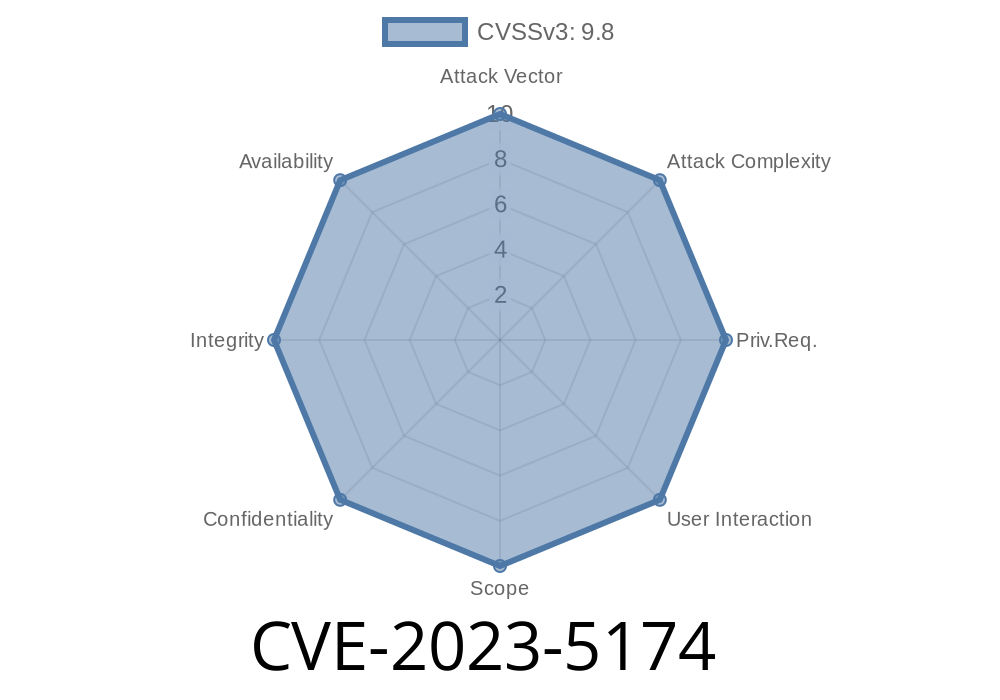CVE-2023-5174 is a serious vulnerability that was found in Mozilla Firefox, affecting its sandbox process creation code on Windows systems. This bug caused a use-after-free situation when a duplicated handle failed during process creation, potentially letting an attacker exploit the crash. This article breaks down what happened, how the exploit works, and what you need to know for protection.
What Is CVE-2023-5174?
The bug, tracked as CVE-2023-5174, arises from mishandling Windows handles during sandbox process creation in Firefox. If Windows failed to duplicate a handle (which can happen in some less common configurations, like when the browser is run as a different user with runas), the Firefox sandbox code could accidentally free a pointer twice—a classic "use-after-free" scenario. This leads to a crash, and under the right circumstances, could allow cyberattackers to control the system.
Important:
This bug only impacts Firefox versions before 118, Firefox ESR versions before 115.3, and Thunderbird versions before 115.3 on Windows. Other operating systems are not affected. It also only arises when running in non-standard configurations—most commonly, the runas command.
Technical Breakdown: How the Bug Happens
Let’s dive into how this vulnerability works. When Firefox creates a sandboxed process, it duplicates certain operating system handles into the sandboxed process. On Windows, this involves calling DuplicateHandle. If this call fails—and the right combination of error-handling mishaps follow—the code can free the same memory region twice.
If DuplicateHandle fails (possible in special setups like runas)
- Error handling code wrongly tries to "clean up" (free) a handle that’s already managed/freed
Let's look at a simplified version of the problematic code, with the use-after-free logic outlined
HANDLE duplicatedHandle = NULL;
if (!DuplicateHandle(
GetCurrentProcess(), originalHandle,
targetProcess, &duplicatedHandle,
, FALSE, DUPLICATE_SAME_ACCESS)) {
// ERROR: DuplicateHandle failed
// Incorrect cleanup (simplified example)
if (duplicatedHandle) {
CloseHandle(duplicatedHandle); // First free
}
goto cleanup;
}
// ... Later in cleanup code ...
if (duplicatedHandle) {
CloseHandle(duplicatedHandle); // Use-after-free: second free
}
Here, if DuplicateHandle failed but still set duplicatedHandle, the code might CloseHandle twice or use memory after it has been freed.
How Could This Be Exploited?
Use-after-free bugs can sometimes be exploited to run arbitrary code. In Firefox’s case, if an attacker can reliably trigger the handle duplication to fail (by getting the victim to launch Firefox in a special way or with a booby-trapped environment), they could potentially manipulate what memory gets freed and reused.
Trigger the error condition that leads to failed handle duplication.
3. Use heap spraying or other memory manipulation to place attacker-controlled data near the freed object.
4. When Firefox reuses the freed memory, the attacker’s data is treated as a valid pointer, leading to code execution.
This isn’t a straightforward “drive-by” attack, since most users run Firefox in the default manner. But it’s still significant—anyone using Firefox in special ways (like in enterprise multi-user environments or automated test runners) could be at risk.
Running Firefox with runas on Windows is a typical way this exploit might be triggered
runas /user:otheruser "C:\Program Files\Mozilla Firefox\firefox.exe"
In this scenario, process handle duplication may fail, starting the chain reaction leading to a use-after-free.
References & More Info
- Mozilla Foundation Security Advisory: MFSA 2023-39
- National Vulnerability Database: CVE-2023-5174 Entry
- Firefox Bugzilla issue #1841285
- Official Fix Release Notes: Firefox 118. release notes
Update to the latest version of Firefox, Firefox ESR, or Thunderbird.
- Avoid running Firefox in non-standard ways (such as using runas), unless necessary and you are on a patched version.
Summary
CVE-2023-5174 highlights how subtle bugs in error handling can create security holes, especially in complex environments like Windows with its handle management. While unlikely to affect casual users, this bug could be a serious risk in enterprise or advanced user setups. Updating your Firefox or Thunderbird is the best defense.
Stay patched and browse safely!
*This article was written exclusively for you, breaking down a tricky use-after-free scenario in plain language. For deeper exploration, check out the official links above!*
Timeline
Published on: 09/27/2023 15:19:42 UTC
Last modified on: 09/29/2023 14:19:44 UTC
